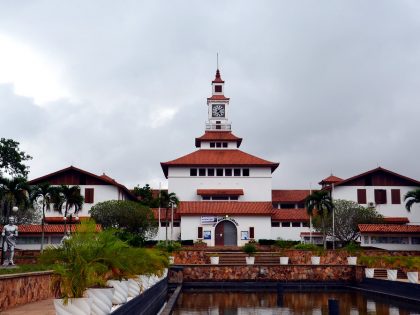
Lessons from Africa’s past to cope with COVID-19
How managing COVID-19 and other crises necessitates Africa’s structural transformation, and what we can learn from the early post-independence development projects.

How managing COVID-19 and other crises necessitates Africa’s structural transformation, and what we can learn from the early post-independence development projects.

Official Ghanaian pan-Africanism is now less motivated by African liberation and solidarity and more by profit incentives. Ghana’s Year of Return is the best example of this.


Ghana’s ruling party has proposed a new law to control the country’s public universities. The country’s academics are fighting it.

Rather than addressing food scarcity, genetically modified crops may render African farmers and scientists more, not less, reliant on global markets.

Plutôt que de pallier l’insécurité alimentaire, les cultures génétiquement modifiées risquent de rendre les agriculteurs et les scientifiques africains plus, et non moins, dépendants des marchés mondiaux.

When the usual rules no longer hold, like in a pandemic, we might find inspiration in the collectivities and working principles of artists.

The coronavirus shut down in Ghana exposes the weaknesses and inequities in the country’s education system.

Like the linguistic hierarchy in postcolonial African countries, a hierarchy exists in the Ghanaian film industry against indigenous film industries.

LBQ Gathering, a collective of LGBTQIA+ activists from Ghana seeks to build a community of queer Ghanaian women and non-binary people.

Talking to other African women about sexual experiences, desires, and fantasies without feeling judged.

Demolishing homes of poor residents in Accra while under lockdown, tells us all we need to know about the Ghanaian state's treatment of working class people.

The use of Evangelical Christianity to oppose progressive policies on sexuality education in schools is another example of Ghana’s march to the right.

Riason Naidoo talks to the curator and editor of a book and traveling exhibition about the work of the legendary, 90 year-old Ghanaian photographer.

The gendered nature of witchcraft accusations, especially against women who deviate from social norms, in Ghana and across Africa.

Ghana's government likes to advertise its "Year of Return" to welcome members of the African diaspora back to the country, but the first returnees, Ratafarians, are still fighting for their rights.

A collective of artists and architects are working to reimagine public space in abandoned property developments in Ghana's capital city.

The author on why she felt compelled to write another book on Nkrumah. This time on Western powers smearing Nkrumah as a Communist.

A movement of young feminists are fighting back against patriarchy and rape culture in Afropop music in Ghana.

The last time Ghana's men's national football team won a tournament was thirty-seven years ago. The team is beginning to feel like yet another failing state institution.